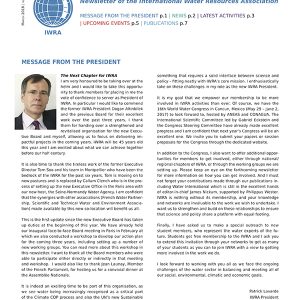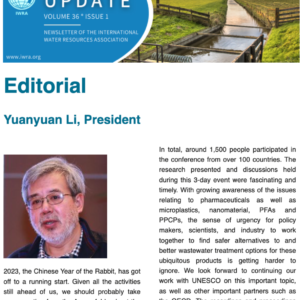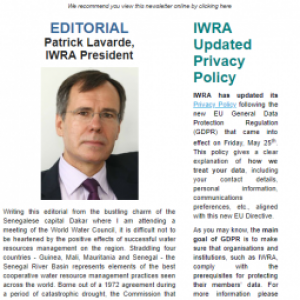 Gabriel Eckstein, IWRA President
Gabriel Eckstein, IWRA President
I hope that all of our Northern Hemisphere members had a good summer and enjoyed some well-deserved time off, and that our friends in the South are having a productive and pleasant spring. As you will see from this newsletter, it has been a busy period for IWRA with preparations for the XVII World Water Congress accelerating. We have around 8 months until we all gather in Daegu to exchange knowledge and information on our latest research and activities in what promises to be a very intense and exciting week. Please remember that while the Congress is open to everyone, at the end of the day it is your Congress! As the world’s largest event linking water researchers and policy practitioners, we are very proud ofwhat we have planned for you, and look forward to lively engagement on some of the world’s most critical water issues.
Building on this last point, it is worthwhile to reflect on the theme for the upcoming Congress, “Foundations for Global Water Security and Resilience: Knowledge, Technology and Policy”. Water security is a topic that has come up more and more frequently in discussions and events on water resources management. IWRA has also just started a joint project with the UNESCO International Centre for Water Security and Sustainable Management (i-WSSM) to collect case studies for an annual report on various aspects of Water Security, beginning this year with the topic of water reuse. And, we are a key strategic partner with the World Water Council leading a water security task force and coordinating water security thematic activities for the 9th World Water Forum in Senegal in 2021.
For IWRA, water security is the safe and reliable water supply for people and the environment, now and in the future. We have been careful to avoid linkages to issues of national security, as this is a separate geopolitical issue.
Building on the outcomes of the XVI World Water Congress in Cancun, we continue to focus on the interface between science and policy. Within this context, various aspects of water security will be raised at the XVII Congress, including: resilience in the face of climate change; how to implement pathways for development and cooperation; how to secure healthy waters, catchments and ecosystems; the use of smart tools and technology; and, of course, how to maximise the social, cultural and economic benefits of increased water security. These issues are becoming increasingly important and urgent from the local to the global level. Moreover, the quality and quantity pressures on our existing water resources are becoming more prominent. As a result, new and innovative solutions are needed more than ever.
In addition, we have seen that ensuring water security is not only a problem for poor countries, but also for wealthy ones. Recent experiences relating to water quality and quantity concerns in places like Flint, Michigan, USA, Cape Town, South Africa, São Paulo, Brazil, Canadian First Nation communities, the Murray Darling River Basin in Australia, and throughout much of India, are but only the tip of the iceberg. But the lessons learned from these experiences are invaluable, and when shared, can help other communities to avoid the same pitfalls and seek measures that work. That is why events like the XVII World Water Congress and the participation of experts such as yourselves are so important.
So, I look forward to welcoming you to Daegu, South Korea, in May 2020 for the XVII World Water Congress, and very much look forward to learning from your knowledge and experiences. Please register now and feel free to contact our Executive Office with any questions.




